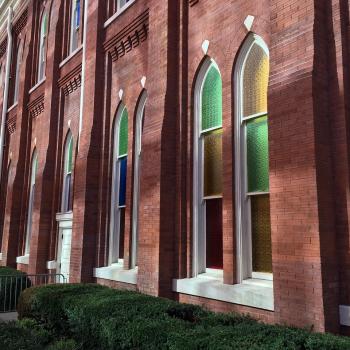Lectionary Reflections
Exodus 16:2-15
September 21, 2014
Just how much is too much? For us first-world types, an iPhone 5 may not be enough in the face of the soon-emerging iPhone 6. A Timex watch pales into insignificance when compared to a Rolex; both tell you the time but they do it in rather distinctly different and, in the latter case, far more expensive ways. For some of us there is just never too much of anything.
In this season of creation (the month of September) we turn to a text that challenges our sense of proportion when it comes to the question of what we need. I did not say what we want, but what we need. This Exodus account is filled with some magic bits, some divine legerdemain, but do not be put off by that. It is after all a story from the wonderful ancient time of the wilderness. We are not called to hunt out the location and time of the manna and quail in the same way that we are not required to go to the castle Elsinore to understand the riches of Hamlet. The story is all here, but as with all good stories they may well be true for all time.
Not two feet out of the slave pits of Egypt, the Israelites begin their "grumbling" against Moses and Aaron and YHWH in the wilderness. This grumbling (or "murmuring" or "complaining") is so endemic among them that it becomes a veritable motif of their activity in the wasteland of the Sinai desert. No sooner has the echo of Miriam's loud song of victory ceased resounding (Ex. 15:21), than the Israelites turn from choir to mob, demanding from Moses water: "And the people complained against Moses, saying, 'What shall we drink?'" (Ex. 15:24). Moses quickly turns brackish water into sweet by hurling a YHWH-supplied tree into it, a clear announcement that "I am the YHWH who heals you" (Ex. 15:26).
But the satisfaction with YHWH's provision ends all too soon, and the grumbling crowd is at it again. "The entire congregation of the Israelites complained against Moses and Aaron in the wilderness. The Israelites said to them, 'If only we had died by YHWH's hand in Egypt, when we sat down by the flesh-filled pots and ate bread until satiation. But you have brought us out into this wilderness to kill the whole assembly with hunger!'" (Ex. 16:3) This would be hilarious, if it were not so pathetically whiney. This bunch, in fact, never had pots filled with meat and unlimited bread back in Egypt; we are told, to the contrary, that they made brick without straw and scrounged a living in any way that they could. Besides, Moses made it abundantly clear to them and to pharaoh that the goal of their escape and subsequent time in the desert was not in fact to murder them, but to bring them to the land long promised by YHWH. These nincompoops are far more than a handful! Little wonder that later, in Exodus 32, Moses may have paused for just a moment when YHWH offers to kill all these clowns and start a new chosen people with Moses at their head (Ex. 32:7-8). Voiding the world of such complainers would certainly make the work of the prophet and lawgiver far easier. All the more remarkable that he offers his own life for the wretches (Ex. 32:32)!
But in response to the grousers, rather than wipe them out, YHWH offers them food. Just like YHWH to supply what they ask, despite the horrid way they have phrased the demand. "I am going to rain bread from the sky for you," announces YHWH, an odd gift of food, but a certain one (Ex .16:4). However, the gift of food comes with a series of strings attached. This divine bread is only good for one day at a time; no matter if the indolent among you do not get enough of it for the day or the greedy among you try to get more than their share, there will only be enough for that one day (Ex. 16:18). This of course implies that there are in fact greedy and sluggards among them; are you surprised?
And they are warned by YHWH and Moses that they must gather twice as much on the sixth day of the magic bread, because there will be none to gather on the seventh day. But, of course, some go out on day seven anyway, looking for a fresh cache of the stuff to fill their ravenous maws with more than they need. But there is not any to be found (Ex. 16:27). The people in every way that they can conjure have not obeyed the commands of YHWH. And these commands are nothing less than YHWH's "torah," God's basic "instruction" for right living as people of God (Ex. 16:5).
God's food parcels consist of "quail," (some sort of bird meat; "quail" is a guess only) in the evening, and "a fine flakey substance," left after the lifting of the dew, in the morning (Ex. 16:13-14). The meat-stuffed complainers have not a clue of what this sweet morning stuff is, so they say, their mouths fairly crammed with it, "What is it?" (Ex. 16:15). So, that became the substance's name, namely "manna," which in Hebrew means, "What is it?" It seems fully appropriate that this unpleasant lot would call the stuff that will sustain them in the desert for forty years "what is it." After all, they have no clue concerning God's constant provision for them; why not grab a handful of "what is it?" It is finally as close as they can come to any sort of recognition of what Moses and God are trying to do for them. "So, God has provided something for you in the desert? Yah, that stuff over there, uh, whatchamacallit, uh, what is it, ya know?"





